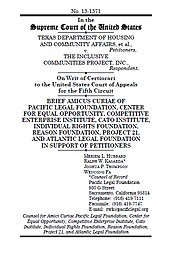Texas Dep’t of Housing & Community Affairs v. The Inclusive Communities Project, Inc.
Learn more about Cato’s Amicus Briefs Program.
Title VIII of the Civil Rights Act, also known as the Fair Housing Act (FHA), makes it illegal to deny someone housing on the basis of race and other protected characteristics. Applicable to governments, private entities, and individuals, the FHA prohibits racially discriminatory practices in most if not all transactions relating to housing. For example, a landlord can’t refuse to rent an apartment to an otherwise qualified tenant, solely on the basis of race. Similarly, banks and credit unions can’t take a borrower’s race into account when deciding whether and on what terms to extend credit for the purpose of buying a home. While it’s clear that the FHA bars such discriminatory intent, it remains an open question whether it covers claims of “disparate impact,” where a neutral policy disproportionately harms members of the protected class. Under this theory, a landlord insisting that all applicants pass a credit check could be held liable if it turns out that applicants from one protected group are disproportionately unlikely to have a sufficiently high credit score. That landlord would be held liable even though a satisfactory credit score is required of all potential tenants, regardless of race, and the landlord’s only intent was the (perfectly legal) desire to avoid tenants who would get behind on their rent—not to deny housing to any particular group. In the decades since the FHA was passed, disparate impact has been used by the government and private litigants to exact tens of millions of dollars in fines and settlements from banks and developers whose facially neutral policies were alleged to have excluded members of a protected class from the housing market. The problem is that unlike other anti-discrimination laws, such as the Americans with Disabilities Act—which expressly prohibits policies that have a disparate impact—the text of the FHA explicitly forbids only intentional discrimination. In 2011, the Supreme Court agreed to decide once and for all the simple question of whether the FHA allows for disparate-impact claims. Before the Court had the chance to rule on the case, however, the government and certain interest groups intervened. Fearing (not without justification) that the Court would decide that the FHA only allows claims based on intentional discrimination, they arranged a settlement package that induced the parties challenging the FHA to drop their case. The same thing happened in 2013. Now the Court is facing the issue a third time, in a case arising out of a Texas program that allocated federal tax credits for developers to build low-income housing projects. The Inclusive Communities Project sued the Texas Department of Housing and Community Affairs, claiming that by attempting in good faith to spend the federal funds in the poor neighborhoods where they’re most needed, the Department violated the FHA by concentrating low-income housing in predominantly minority neighborhoods. Together with the Pacific Legal Foundation and five other groups, Cato has filed a brief arguing that the FHA can’t be read to prohibit innocently adopted policies that happen to have a statistically disproportionate impact on one group. The brief makes three key points. First, the text of the FHA doesn’t support disparate-impact claims. The relevant provision—making it unlawful to “refuse to sell or rent … because of race”—connotes a purposeful, causal connection between the refusal to deal and the person’s race. Second, the FHA’s legislative history reveals that Congress only intended to target intentional discrimination, not the unpredictable consequences of nondiscriminatory policies. Finally, allowing for claims against government bodies to be based on disparate impact forces them to engage in unconstitutional race-conscious decision making to avoid potential liability. The only way to avoid claims based on disparate impact is by designing policies which work backwards from the desired result, essentially requiring unconstitutional devices like racial quotas. But discrimination can’t lead to equality. As Chief Justice John Roberts wrote for a Supreme Court plurality in 2007: “The way to stop discrimination on the basis of race is to stop discriminating on the basis of race.”
